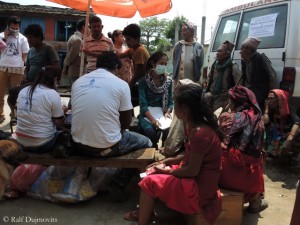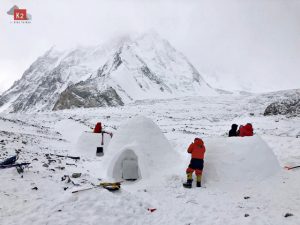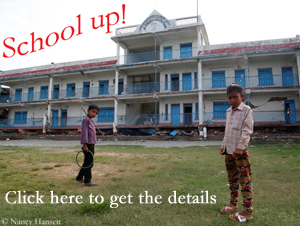Taxes on relief goods – what’s the point of that?
There is considerable indignation. Since British media reported that the Nepalese government put an income tax of 15 to 30 per cent on relief goods for earthquake victims, the authorities in Kathmandu are subjected to sharp criticism in the social networks. The guideline that tents and tarpaulin were custom free had expired on 3 June. A week ago, government officials had announced that relief goods could be still imported without paying taxes, but only if they would then be distributed by governmental organizations. “An organization which wants to distribute imported goods itself has to pay full customs duty”, said Surya Sedai of the Department of Customs. “This is to minimize the risk of smuggling.” Some international organizations already complained about harassment. On the internet, votes are collected for a petition to Nepal’s Prime Minister Sushil Koirala to “stop levying taxes on materials imported to aid sufferers of the Nepalese earthquakes”. I talked about the topic with German aid organizations.
One hand does not know what the other is doing
Their problems with customs have so far remained within limits. “According to our staff in Nepal, there were no such occurrences”, said Sabine Wilke of the aid organization Care. “So far, we got about half of our relief supplies from abroad. The other half came from Nepal itself. This part should be now increased up to 75 percent.” That could make the matter resolve itself.
“We have no major problems. We still distribute our relief supplies and keep the government informed of it”, said Vassiloios Saroglou of AWO International, when I asked him about the new customs guideline. “Of course there was a little turmoil and some uncertainty among our partners in Nepal. Our local staff then asked the government about it. Partly one ministry did not know what the other ministry was doing. But in the end, we were not really affected. 22 trucks carrying relief supplies drove from India to Nepal without having to pay customs duties at the border.” Saroglou believes that World Vision benefits from the fact that the organization has an office in Nepal since 2009: “We are registered, we are on the spot. and we work together with local partners.”
Problems are partly man-made
It just helps if you know each other. This was confirmed by Dirk Bathe of World Vision. The organization is supporting Nepal for over 30 years. “Immediately after the earthquake, there was an organizational failure of the authorities”, said Bathe. “But then we have been negotiating intensively with them. Our supplies then reached the country custom free, were stored properly and could be transported to where they were needed.” The distribution of the relief goods were coordinated by OCHA, the United Nations Office for the Coordination of Humanitarian Affairs, and the Nepalese authorities were informed.
“Some of the problems of humanitarian organizations were man-made. The government has even a legitimate interest in knowing what is coming into the country”, Bathe said. “It has happened that groups of three people appeared in Kathmandu and with any aid stuff in their baggage. That was just naive.” Nevertheless there should be no unnecessary bureaucratic obstacles now, said the spokesman of World Vision. “Because of the onset of monsoon especially the food supply becomes more and more difficult. The less bureaucracy, the better!”
European Parliament votes on Nepal resolution
A group of European parliamentarians sees it the same way. “Providing humanitarian relief to people living in remote hard-to-reach areas, which risk to be further isolated in the monsoon period, must be a priority”, says a draft resolution. The European Parliament will debate and vote on it on Thursday. It also includes the custom problem. The Government of Nepal has to ensure that relief goods “be exempt of customs duties and taxes” and has to solve “ the obstacles resulting in lengthy customs clearance and other administrative procedures”, says the draft.
Nepal urgently needs further help from abroad. According to OCHA about 300 million US dollars have been donated so far. More than 400 million dollars are still required.
Update 12 June: The European Parliament adopted the resolution on Nepal by 602 votes to 11, with 22 abstentions.








